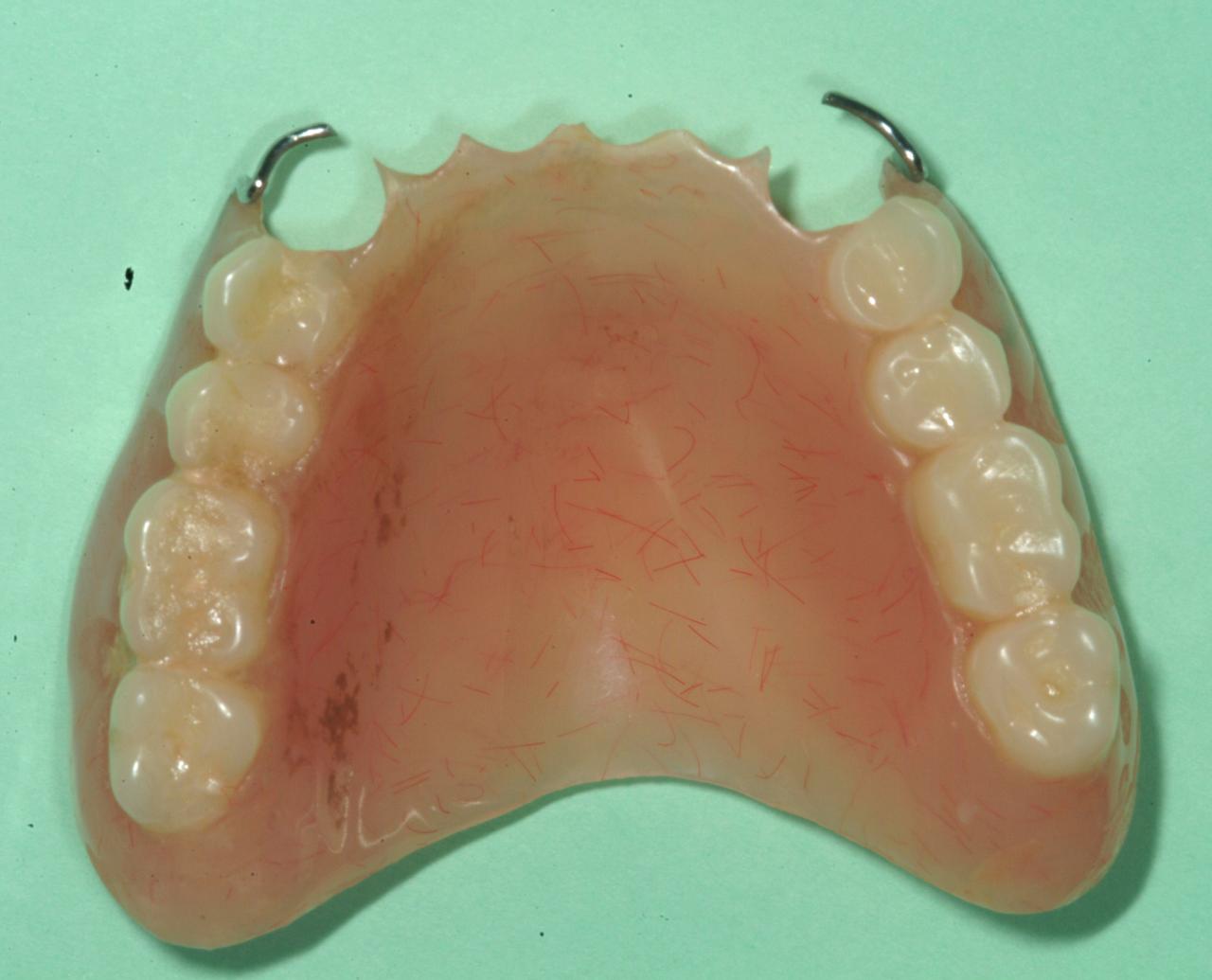Partial dentures for upper back teeth take the spotlight in this comprehensive guide, offering a relaxed yet informative approach to the topic. Get ready to delve into the world of replacing missing teeth with partial dentures that specifically target the upper back area.
In the following paragraphs, we will explore the different types of partial dentures available, their benefits, the procedure for getting them, potential issues and solutions, as well as the cost and insurance coverage involved. Brace yourself for an engaging journey filled with valuable insights and practical tips.
Introduction to Partial Dentures for Upper Back Teeth
Partial dentures are removable dental appliances that are used to replace missing teeth in the mouth. They are specifically designed to fit around the remaining natural teeth and restore the functionality and appearance of the smile.
The purpose of partial dentures is to fill in the gaps left by missing teeth, allowing individuals to chew and speak properly. They also help to maintain the alignment of the remaining teeth and prevent them from shifting or moving out of place.
Importance of Replacing Missing Teeth
Replacing missing teeth is crucial for several reasons. Firstly, it helps to restore proper chewing function, allowing individuals to enjoy a varied and nutritious diet. When teeth are missing, it can be difficult to bite and chew certain foods, leading to nutritional deficiencies.
Secondly, missing teeth can have a negative impact on speech. Teeth play a crucial role in the formation of sounds, and when they are missing, it can result in speech impediments and difficulties in communication.
Furthermore, the loss of teeth can affect the aesthetics of the smile, leading to a lack of confidence and self-esteem. By replacing missing teeth with partial dentures, individuals can regain their natural smile and feel more comfortable and confident in social interactions.
Common Reasons for Needing Partial Dentures for Upper Back Teeth
There are several common reasons why people may need partial dentures specifically for their upper back teeth:
- To replace multiple missing teeth in the upper back region.
- To restore proper chewing function and prevent strain on the remaining teeth.
- To maintain the alignment of the remaining teeth and prevent them from shifting.
- To improve speech clarity and prevent speech impediments.
- To enhance the aesthetics of the smile and boost self-confidence.
Types of Partial Dentures for Upper Back Teeth
Partial dentures for upper back teeth come in different types, each with its own advantages and considerations. These types include:
1. Removable Partial Dentures
Removable partial dentures, as the name suggests, can be easily taken out and put back into the mouth by the patient. They are made up of replacement teeth attached to a gum-colored plastic base. Removable partial dentures often have metal clasps that hold onto the adjacent natural teeth for stability.
They are a popular choice for replacing missing teeth as they are relatively affordable and offer flexibility.
2. Fixed Partial Dentures (Bridges)
Fixed partial dentures, also known as bridges, are a non-removable option for replacing missing teeth. They consist of artificial teeth that are anchored to the adjacent natural teeth using dental crowns. Fixed partial dentures are considered to be more stable and comfortable compared to removable dentures.
However, they require the adjacent teeth to be strong and healthy enough to support the bridge.
3. Flexible Partial Dentures
Flexible partial dentures are a newer option that offers a more comfortable and aesthetic alternative to traditional removable dentures. They are made from a flexible, lightweight material called nylon. Flexible partial dentures are designed to blend in with the natural gum color and are less noticeable compared to metal-based dentures.
They also provide a better fit and greater comfort for the wearer.
Materials Used in Making Partial Dentures
Partial dentures are typically made from a combination of materials, including:
Acrylic resin
This is commonly used for the base of the denture and for the artificial teeth. Acrylic resin is durable and can be easily customized to match the color and shape of the natural teeth.
Metal alloys
Metal alloys, such as titanium or cobalt-chromium, are often used for the framework of removable partial dentures. These alloys provide strength and stability to the denture.
Flexible nylon
Flexible partial dentures are made from a flexible nylon material that is lightweight and comfortable to wear. The nylon material allows for a more natural fit and better retention.Comparison between Removable and Fixed Partial Dentures:Removable partial dentures offer the advantage of being easily removable for cleaning and maintenance.
They are also a more affordable option compared to fixed dentures. On the other hand, fixed partial dentures provide greater stability and comfort as they are securely anchored to the adjacent natural teeth. They also do not need to be removed for cleaning.
However, fixed partial dentures require healthy adjacent teeth to support the bridge and may be a more expensive option.Overall, the choice between removable and fixed partial dentures depends on the individual’s specific needs and preferences, as well as the condition of their natural teeth.
Benefits of Partial Dentures for Upper Back Teeth
Partial dentures for upper back teeth offer several benefits to individuals who wear them. These benefits include improved chewing and speaking abilities, as well as a positive impact on overall oral health.Partial dentures are designed to replace missing teeth, especially in the posterior region of the mouth.
By filling in the gaps left by missing teeth, partial dentures restore the ability to properly chew and break down food. This not only improves digestion but also allows individuals to enjoy a wider variety of foods without discomfort or difficulty.In
addition to improving chewing abilities, partial dentures also help in enhancing speaking abilities. Missing teeth can affect the way words are pronounced, leading to speech difficulties. By replacing missing teeth with partial dentures, individuals regain their ability to speak clearly and confidently.Furthermore,
partial dentures play a crucial role in maintaining overall oral health. When teeth are missing, the remaining teeth can shift and become misaligned. This can lead to various dental issues such as bite problems, jaw pain, and increased risk of tooth decay and gum disease.
By wearing partial dentures, the remaining teeth are supported and kept in their proper positions, preventing these complications and promoting better oral health.Now, let’s hear some stories from individuals who have benefited from wearing partial dentures:
- John, a 55-year-old man, had several missing teeth in his upper back teeth. He struggled with chewing his favorite foods and felt self-conscious while speaking. After getting partial dentures, John noticed a significant improvement in his ability to eat comfortably and speak clearly.
He mentioned how the partial dentures had restored his confidence and allowed him to enjoy social interactions without worrying about his teeth.
- Sarah, a 40-year-old woman, had been avoiding dental visits for years due to her missing upper back teeth. This had resulted in the shifting of her remaining teeth, causing bite problems and frequent headaches. After consulting with her dentist, Sarah decided to get partial dentures.
Within a few weeks of wearing them, she experienced relief from her headaches and noticed an improvement in her overall oral health. Sarah was grateful for the positive impact that partial dentures had on her quality of life.
These stories highlight the transformative effects of partial dentures for individuals with missing upper back teeth. Whether it’s restoring chewing and speaking abilities or promoting better oral health, partial dentures offer a practical and effective solution for those in need of tooth replacement.
Procedure for Getting Partial Dentures for Upper Back Teeth
Getting partial dentures for upper back teeth involves several steps to ensure a proper fit and function. Here is an overview of the procedure:
1. Consultation and Examination
The first step is to schedule a consultation with a dentist who specializes in dentures. During this appointment, the dentist will examine your teeth and gums, take impressions of your mouth, and discuss your treatment options. They will also assess the condition of your upper back teeth and determine if partial dentures are the best solution for you.
2. Treatment Planning, Partial dentures for upper back teeth
Once the dentist has gathered all the necessary information, they will develop a treatment plan tailored to your specific needs. This plan will Artikel the steps involved in creating and fitting your partial dentures. The dentist will also discuss the expected timeline and any potential costs associated with the treatment.
3. Teeth Preparation
In some cases, the dentist may need to prepare your remaining upper back teeth before creating the partial dentures. This can involve removing any decayed or damaged tooth structure and shaping the teeth to ensure a proper fit for the dentures.
The dentist will use local anesthesia to ensure your comfort throughout this process.
4. Impressions and Bite Registration
To create your partial dentures, the dentist will take impressions of your upper back teeth and the surrounding areas. These impressions will serve as a blueprint for the dental lab technician who will fabricate your dentures. The dentist will also record your bite registration, which helps ensure that your dentures will fit properly and allow for comfortable chewing and speaking.
5. Denture Fitting and Adjustments
Once your partial dentures are ready, you will return to the dentist for the fitting appointment. The dentist will carefully place the dentures in your mouth and make any necessary adjustments to ensure a proper fit. It is important to communicate any discomfort or areas of irritation during this appointment, as the dentist can make further adjustments to enhance the comfort and functionality of your dentures.
6. Follow-up Appointments
After the initial fitting, you will need to schedule follow-up appointments with your dentist. These appointments allow the dentist to assess your progress, make any additional adjustments to the dentures, and address any concerns or issues you may have. Regular check-ups are essential to ensure that your partial dentures continue to fit properly and provide optimal function.
Tips for Caring and Maintaining Partial Dentures
- Remove and rinse your partial dentures after eating to remove any food particles.
- Brush your dentures daily using a soft-bristled toothbrush and denture cleaner or mild soap.
- Soak your dentures in a denture-cleaning solution or water overnight to keep them moist and clean.
- Avoid using hot water or abrasive cleaners, as they can damage the dentures.
- Handle your dentures with care to avoid dropping them or bending the clasps.
- Visit your dentist regularly for check-ups and professional cleaning of your partial dentures.
Remember, proper care and maintenance of your partial dentures are crucial for their longevity and your overall oral health. Follow these tips and consult your dentist if you have any concerns or questions about your dentures.
Potential Issues and Solutions with Partial Dentures for Upper Back Teeth

Partial dentures for upper back teeth can be a beneficial solution for individuals who have missing teeth. However, there are potential issues that individuals may encounter when using these dentures. It is important to be aware of these problems and know how to address them for a comfortable and functional experience.
Discomfort or Soreness
One common issue individuals may experience with partial dentures for upper back teeth is discomfort or soreness. This can be caused by various factors such as an improper fit, pressure points, or irritation from the dentures rubbing against the gums or other oral tissues.
To address discomfort or soreness, it is essential to visit a dentist who specializes in denture adjustments. They can assess the fit of the dentures and make any necessary modifications to ensure a comfortable fit. It is important not to attempt to adjust the dentures yourself, as this can lead to further issues.
Importance of Regular Dental Check-ups
Regular dental check-ups are crucial for maintaining optimal oral health with partial dentures for upper back teeth. These check-ups allow the dentist to monitor the condition of the dentures and address any potential issues before they become more severe.
During these check-ups, the dentist will examine the fit of the dentures, check for any signs of damage or wear, and assess the overall oral health. They may also recommend professional cleaning to remove any plaque or tartar buildup that can affect the fit and function of the dentures.
Additionally, regular dental check-ups provide an opportunity for individuals to discuss any concerns or discomfort they may be experiencing with their dentures. The dentist can provide guidance and solutions to address these issues, ensuring the continued comfort and functionality of the dentures.
Cost and Insurance Coverage for Partial Dentures for Upper Back Teeth
Partial dentures for upper back teeth can be a cost-effective solution for replacing missing teeth. However, the cost of partial dentures can vary depending on several factors.
Factors that can affect the cost of partial dentures:
- The type of material used: The cost of partial dentures can vary based on the material used for the base and the artificial teeth. Materials like acrylic, metal, or a combination of both can affect the overall cost.
- The complexity of the case: If additional procedures, such as tooth extractions or gum treatments, are required before getting partial dentures, it can increase the overall cost.
- The number of teeth being replaced: The more teeth that need to be replaced, the higher the cost of partial dentures.
- The expertise of the dentist: Experienced dentists may charge higher fees for their services, which can impact the cost of partial dentures.
Insurance coverage for partial dentures:
Insurance coverage for partial dentures can vary depending on the insurance plan. Some dental insurance plans may cover a portion of the cost of partial dentures, while others may not provide any coverage at all.
It is important to review your dental insurance policy or contact your insurance provider to understand what is covered and what expenses you may be responsible for.
Tips for finding affordable options and financing possibilities:
- Shop around for different dental providers and compare prices. Some dentists may offer more affordable options for partial dentures.
- Consider dental schools or clinics that offer discounted rates for dental treatments, including partial dentures.
- Inquire about financing options or payment plans that can help make the cost of partial dentures more manageable.
- Discuss your budget and financial concerns with your dentist. They may be able to recommend alternative options or suggest ways to reduce costs.
Last Word
To sum it up, partial dentures for upper back teeth provide a convenient and effective solution for replacing missing teeth in this specific area. From improving chewing and speaking abilities to maintaining overall oral health, these dentures have numerous benefits.
Remember to prioritize proper fitting and regular dental check-ups for optimal results. With the right care and maintenance, you can confidently embrace a restored smile and enhanced quality of life.
Q&A
What are partial dentures?
Partial dentures are removable dental appliances that replace missing teeth. They consist of artificial teeth attached to a gum-colored plastic base, which is custom-made to fit your mouth.
Why is it important to replace missing teeth with partial dentures?
Replacing missing teeth with partial dentures not only improves your appearance but also restores your ability to chew and speak properly. It also helps prevent the remaining teeth from shifting and supports the overall structure of your mouth.
Can partial dentures be fixed or removable?
Yes, there are both fixed and removable options for partial dentures. Fixed partial dentures, also known as dental bridges, are cemented into place and cannot be removed. Removable partial dentures, on the other hand, can be taken out for cleaning and sleeping.
How do partial dentures improve overall oral health?
Partial dentures help distribute the forces of your bite evenly, reducing the strain on remaining natural teeth. They also support facial muscles, prevent bone loss, and improve digestion by enhancing chewing efficiency.
What is the cost of partial dentures?
The cost of partial dentures can vary depending on factors such as the materials used, the complexity of the case, and the dentist’s fees. It is best to consult with your dentist for an accurate cost estimate.


